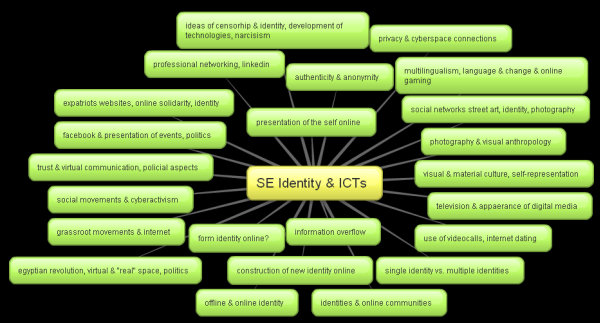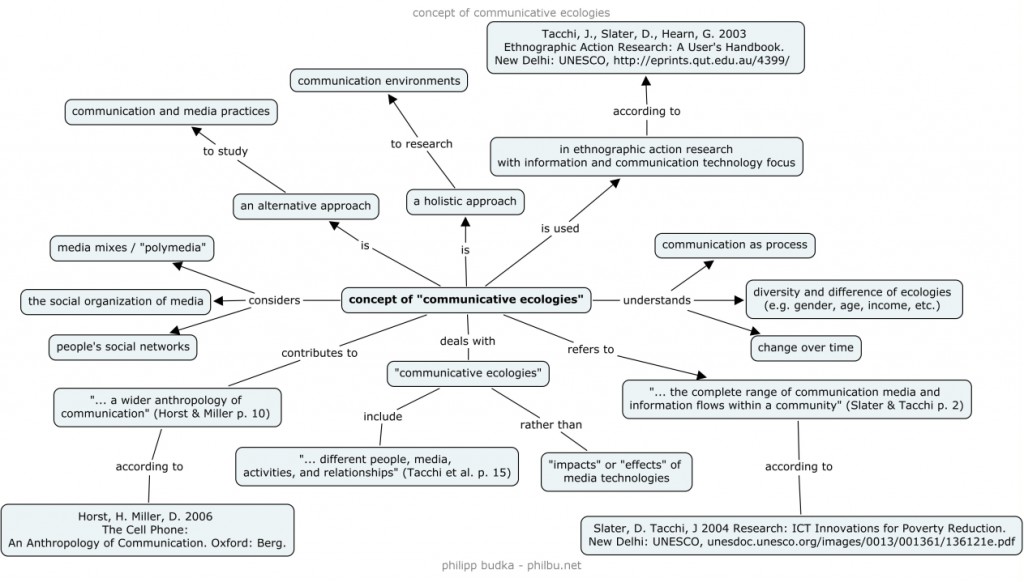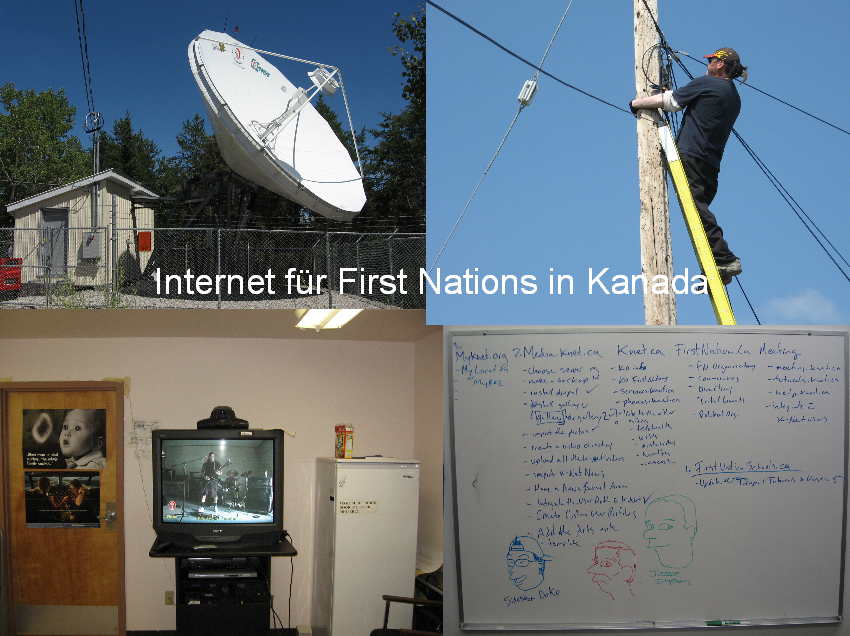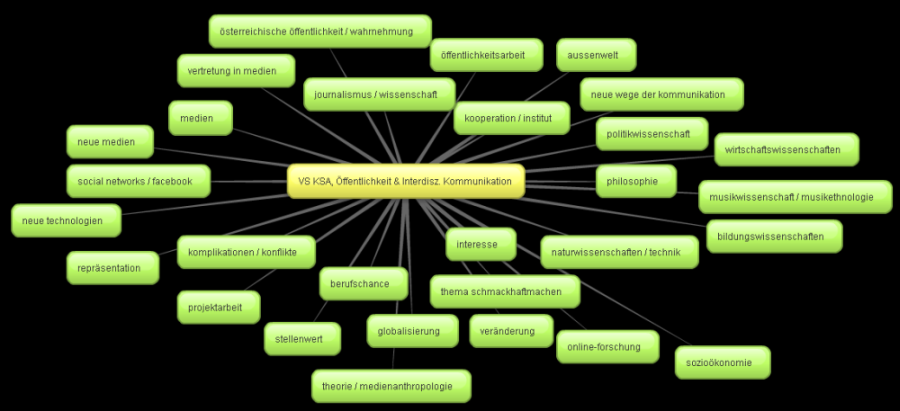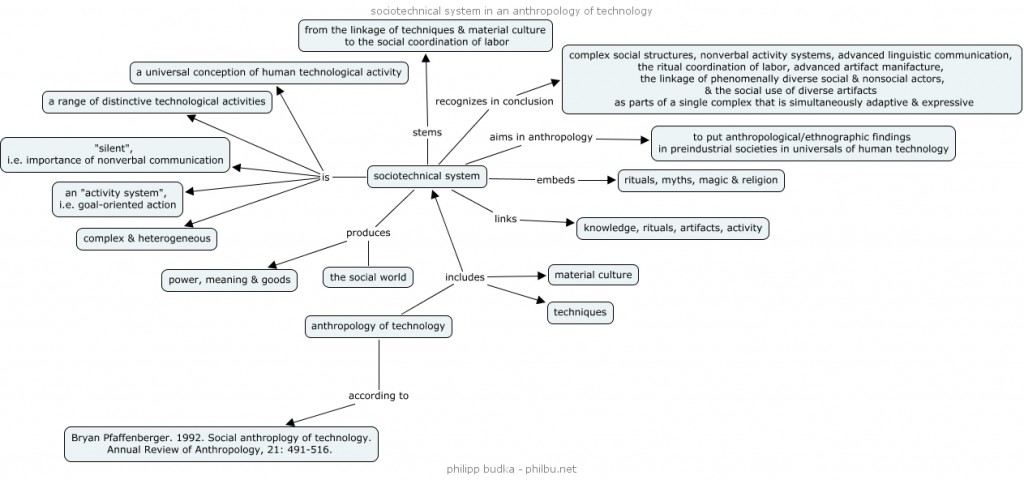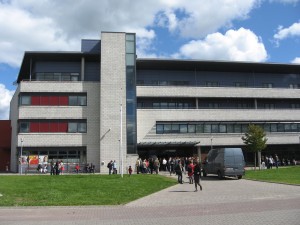Word cloud of the student projects in the seminar “Identity, sociality & communality in times of digital media technologies” at the Department of Social and Cultural Anthropology, University of Vienna.
Posts categoriezed as sociocultural anthropology
Seminar research projects
In the seminar “Identity, sociality & communality in times of digital media technologies” at the Department of Social and Cultural Anthropology, University of Vienna, students work in research teams on aspects of privacy, gaming, movements, participation, solidarity and visual culture.
Seminar: Identity, sociality and communality in times of digital media technologies
In the winter term 2012/2013, I am teaching a seminar on “Identity, sociality and communality in times of digital media technologies” at the Department of Social and Cultural Anthropology, University of Vienna. Students in this course learn about and to work with different forms of identity construction and processes of sociality and communality, which have been made possible through digital media technologies, such as the internet. Students get a brief overview about identity concepts and the possibility to deploy them within empirical research projects.
Find more information about this seminar here: http://www.philbu.net/courses.html
Concept map: Communicative ecologies
This map visualizes the concept of “communicative ecologies” as introduced by Tacchi, J., Slater, D., Hearn, G. 2003. Ethnographic Action Research: A User’s Handbook. New Delhi: UNESCO, http://eprints.qut.edu.au/4399/. It was done by using the free CMap Tools (click to enlarge).
Article: “We were on the outside looking in”: MyKnet.org – A First Nations Online Social Environment in Northern Ontario
Bell, B., Budka, P., Fiser, A. 2012. “We were on the outside looking in”: MyKnet.org – A First Nations online social environment in northern Ontario. In A. Clement, M. Gurstein, G. Longford, M. Moll & L. R. Shade (Eds.), Connecting Canadians: Investigations in Community Informatics (pp. 237-254). Edmonton: Athabasca University Press.
“In 2000, one of Canada’s leading Aboriginal community networks, the Kuh-ke-nah Network, or K-Net, was on the verge of expanding into broadband services. (For more on K-Net, see chapter 14.) K-Net’s management organization, Keewaytinook Okimakanak Tribal Council, had acquired funding and resources to become one of Industry Canada’s Smart Communities demonstration projects. Among the innovative services that K-Net introduced at the time was MyKnet.org, a system of personal home pages intended for remote First Nations users in a region of Northern Ontario where numerous communities have lived without adequate residential telecom service well into the millennium (Fiser, Clement, and Walmark 2006; Ramírez et al. 2003). Shortly thereafter, and through K-Net’s community-based Internet infrastructure, this free-of-charge, free-of-advertising, locally supported, online social environment grew from its core constituency of remote First Nations communities to host over 30,000 registered user accounts (of which approximately 20,000 represent active home pages). …”
free chapter download: http://www.aupress.ca/index.php/books/120193
Vortrag: IKT als Werkzeuge zur Reduktion erzwungener Mobilität
Vortrag im Rahmen der 7. Tage der Kultur- und Sozialanthropologie: “Informations- und Kommunikationstechnologien (IKT) als Werkzeuge zur Reduktion erzwungener Mobilität” (PDF)
Aus dem Inhalt:
- Indigene in Kanada & im Nordwestlichen Ontario
- Sitation von First Nations im Nordwestlichen Ontario
- Indigene IKT im Nordwestlichen Ontario: KO-KNET
- Reduktion erzwungener Mobilität durch IKT
- IKT-Anwendungspraktiken: Isolation vs. Sozialität
- Indigene IKT: Ergebnisse aktueller Studien
Indigene IKT: Ergebnisse aktueller Studien:
- IKT-Praktiken beeinflussen …
a) (kulturelle) Identitätskonstruktion & -verhandlung
b) (soziale) Vergemeinschaftungsformen & -prozesse
c) Kommunikationspraktiken
- Entscheidend sind …
a) Kontrolle von & Bezug zu IKT
b) Soziokulturelle, geographische & politische Kontexte/Rahmenbedingungen/Möglichkeiten
Vortrag: Indigene Medientechnologien
Gastvortrag im Rahmen der Vorlesung “Einführung in die Kultur- und Sozialanthropologie” (Sommersemester 2012, Leitung: Elke Mader): “Indigene Medientechnologien – Produktion & Anwendungspraktiken aus medienanthropologischer Perspektive“: Teil 1 / Teil 2 (PDF)
Aus dem Inhalt:
- Medientechnologien aus kultur- und sozialanthropologischer & ethnographischer Perspektive
- Indigene Medien:
Indigene?
Indigene IKT: „outreach“ Praktiken z.B. EZLN in Mexiko, „inreach“ Praktiken: z.B. KO-NET in Kanada - Indigene Medientechnologieproduktion: Beispiel „Internet für First Nations in Kanada“
- Indigene Medienanwendungspraktiken: Beispiel „MyKnet.org: Social Networking für First Nations in Kanada“ – Identitätskonstruktion, Vergemeinschaftungsformen, ethnographische Felderforschung
Seminar: Public and Interdisciplinary Communication in Social and Cultural Anthropology
In the summer term 2012, I am organizing the seminar “Public and Interdisciplinary Communication in Social and Cultural Anthropology” at the Department of Social and Cultural Anthropology, University of Vienna. More details on the seminar’s objectives, methods and topics can be found here in German: http://www.philbu.net/courses.html#details
A first round of brainstorming with the students about social and cultural anthropology in relation to “the public” and forms of interdisciplinarity resulted in this mind map (German):
Ethnographie als theoretischer & epistemologischer Ansatz
Ideen und Anmerkungen zur Ethnographie als theoretischer und epistemologischer Forschungsansatz, die im Rahmen eines Jour Fixe der Gruppe Internetforschung am 09.01.2012 diskutiert wurden. Dabei wurde vor allem der Frage nachgegangen wie Ethnographie in der Internetforschung Verwendung finden kann.
Ethnographie ist eine Theorie des Beschreibens (Nader)
→ Kontext
→ Holismus → Imagination von Gesamt- oder Ganzheit
Ethnographie ist keine Methode (Ingold)
→ Ethnographie = beschreibende Integration (durch Kontextualisierung)
→ Ethnographie = Praxis verbaler Beschreibung
Praktische Aspekte / Probleme einer Ethnographie
→ Prozess der teilnehmenden Beobachtung
→ Inklusion der Forscherin / „Wir & die Anderen“
→ Wandel in Zeit & Raum
→ Hierarchien von Kontexten
Ethnographie & Interdisziplinarität (Strathern)
→ Interaktion von Disziplinen
→ Kontextspezifika entscheiden über Ethnographie → Schaffung von Kontext
→ Multi- → Inter- → Transdisziplinarität → von „information-sharing“ zu „knowledge-creation“
Literatur:
Ingold, T. 2008. Anthropology is not ethnography. In: Proceedings of the British Academy 154: 69-92. Online: http://www.proc.britac.ac.uk/cgi-bin/somsid.cgi?page=154p069&session=825683A&type=header
Nader, L. 2011. Ethnography as theory. In: HAU: Journal of Ethnographic Theory 1(1): 211-219. Online: http://www.haujournal.org/index.php/hau/article/view/34
Strathern, M. 2005. Experiments in interdisciplinarity. In: Social Anthropology 13(1): 75-90.
Paper: From Cyber to Digital Anthropology to an Anthropology of the Contemporary
Philipp Budka’s Paper at the DGV (German Anthropological Association) conference in Vienna, 14-17 September 2011, Workshop “Cyberculture” organized by Alexander Knorr
Abstract
This paper is first taking a look back on the “anthropology of cyberculture”, formulated as anthropological research area, concept and issue by Escobar in 1994. Inspired by science and technology studies, he painted a very vivid picture how anthropology and ethnography could contribute to the understanding of new bio and communication technologies as society’s transforming driving forces. Pushed by powerful digital media technologies, such as internet applications and services, anthropology labelled as “digital anthropology” is currently tempted to forget about cyberanthropology’s holistic effort of understanding the sociocultural construction and interpretation of bio and communication technologies. What is the legacy of the anthropology of cyberculture when dealing with new digital practices? Is it actually necessary to construct branches of anthropology that deal with contemporary sociocultural developments? Or should we just open the discipline to an “anthropology of the contemporary”, as Rabinow and Marcus (2008) propose?
References
Escobar, Arturo. 1994. Welcome to Cyberia. Notes on the anthropology of cyberculture. In Current Anthropology, 35/3: 211-231.
Rabinow, Paul, Marcus, George E. (with Faubion, James D., Rees, Tobias) 2008. Designs for an anthropology of the contemporary. Durham: Duke University Press.
Links
http://www.tagung2011.dgv-net.de/
Concept map: Sociotechnical system in an anthropology of technology
This concept map builds on Bryan Pfaffenberger’s article “Social anthropology of technology”, Annual Review of Anthropology 21(1992), pp. 491-516, in which he discusses the use of sociotechnical systems in an anthropological context. This map tries to visualize the concept. It was done by using the free CMap Tools (click to enlarge).
New Book: Theorising Media and Practice (Bräuchler & Postill 2010)
Bräuchler, B. and J. Postill (eds) 2010. Theorising Media and Practice. Oxford and New York: Berghahn.
From John Postill’s blog:
This book is very much a product of the numerous conversations we’ve had down the years on the EASA Media Anthropology Network on practice approaches to media. We’re really grateful to all chapter contributors and to all of network members who have helped us think through some of the key questions.
Synopsis
Although practice theory has been a mainstay of social theory for nearly three decades, so far it has had very limited impact on media studies. This book draws on the work of practice theorists such as Wittgenstein, Foucault, Bourdieu, Barth and Schatzki and rethinks the study of media from the perspective of practice theory. Drawing on ethnographic case studies from places such as Zambia, India, Hong Kong, the United States, Britain, Norway and Denmark, the contributors address a number of important themes: media as practice; the interlinkage between media, culture and practice; the contextual study of media practices; and new practices of digital production. Collectively, these chapters make a strong case for the importance of theorising the relationship between media and practice and thereby adding practice theory as a new strand to the anthropology of media.
More information: http://berghahnbooks.com/title.php?rowtag=BrauchlerTheorising
Video: About “doing anthropology”
MIT anthropologists in this short video talk about doing anthropology, about their personal experiences with working as anthropologists and ethnographers.
From: http://techtv.mit.edu/videos/315-doing-anthropology
“Thoughts on Fieldwork From Three Research Sites
Cultural Anthropology is a social science that explores how people understand – and act in – the world. But what, exactly, is it that Cultural Anthropologists do? How do they approach their research? In this short film, three members of MIT’s Anthropology Department, Stefan Helmreich, Erica James, and Heather Paxson, talk about their current work and the process of doing fieldwork.”
Lecture: Media Ethnographies – Ethnography in/and the Anthropology of Media
In the winter term 2010/2011 Philipp is giving a lecture on media ethnographies in the context of an anthropology of media technologies at the Department of Social and Cultural Anthropology, University of Vienna. By using different case studies, the lecture aims to highlight the importance of ethnography in understanding media phenomena.
For more information in German go to: http://www.philbu.net/courses.html
Report on the 11th Biennial EASA 2010 Conference
Report on the 11th Biennial EASA 2010 Conference “Crisis and Imagination”,
National University of Ireland Maynooth, 24-27th August 2010
by Philipp Budka
(University of Vienna)
This report focuses only on those workshops I attended during the conference. They all deal with media (technology) practices in/and social and cultural anthropology. For a complete list of workshops and thematic areas, take a look at the conference website: http://www.easaonline.org/conferences/easa2010/index.htm
- Full Report as PDF
- Conference fotos and more information about media anthropology can be found at the EASA Media Anthropology Network website
25 August 2010: EASA Media Anthropology Network Workshop “The rewards of media”
Convenors: John Postill & Philipp Budka
(http://www.nomadit.co.uk/easa/easa2010/panels.php5?PanelID=648)
John Postill introduces to the workshop’s theme, procedure and schedule. “The workshop explores the rewards (social, economic, symbolic, sensory, etc., cf. Warde 2005) derived from engaging in specific media practices in different sociocultural settings.” (more: http://www.nomadit.co.uk/easa/easa2010/panels.php5?PanelID=648).
1) John Postill & Francisco Orsorio “Mobile rewards: a critical review of the Mobiles for Development (M4D) literature”
In the workshop’s first paper John and Francisco review literature in the field of mobile technologies, particular phones, for development.
…
26 August 2010: Workshop “Digital Anthropology”
Convenors: Daniel Miller & Heather Horst
(http://www.nomadit.co.uk/easa/easa2010/panels.php5?PanelID=599)
Introduction to the workshop by Daniel Miller. “How can anthropology contribute to an understanding of the impact of new digital technologies? This session explores topics ranging from how digital technologies become part of everyday life to their role in the development of new infrastructures within both commerce and the state.” (more: http://www.nomadit.co.uk/easa/easa2010/panels.php5?PanelID=599).
1) Daniel Miller & Heather Horst “A brief theory of digital anthropology”
Daniel gives an introduction to the theory of digital anthropology by presenting the study program for digital anthropology at the University College London and two ethnographic case studies.
…
27 August 2010: Workshop “Engaging anthropology in practice: pedagogical exchanges with media practitioners”
Convenors: Caroline Gatt, Rachel Harkness, Thomas Hylland Eriksen, Joseph Long
(http://www.nomadit.co.uk/easa/easa2010/panels.php5?PanelID=621)
Introducing to the workshop and its theme are Caroline Gatt, Rachel Harkness, and Joseph Long. How can anthropology engage with media practitioners and in e.g. media training programs?
“Launching “Engaging Anthropology in Practice”, a project based in Scotland, this panel will showcase anthropological engagements of various publics by European practitioners in order to learn from this work and create links for future cooperation. Presentations have been requested that reflect upon the practicalities of engagement. Discussion in the latter part of the session will consider the development of anthropological training in the light of these experiences.” (more: http://www.nomadit.co.uk/easa/easa2010/panels.php5?PanelID=621).
1) Julia Bayer “Awareness training for journalists and its potential for the promotion of media diversity”
Julia, in her presentation, is introducing an awareness training program for journalists in Germany.
…

